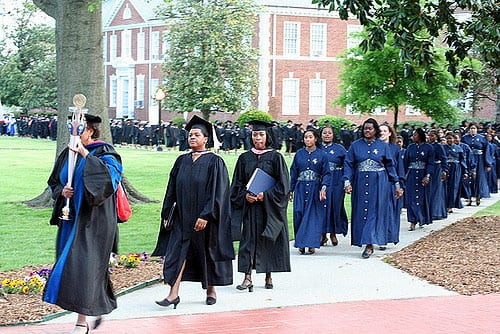
February 22, 2019; Winston-Salem Journal
Last Friday, “Bennett College lost its accreditation and got it right back,” writes John Newsom in the Winston-Salem Journal. First, the Southern Association of Colleges and Schools Commission on Colleges (SACS) announced around noon that Bennett had lost its appeal to hold onto its accreditation even though, as Newsom points out, Bennett had raised “nearly twice as much money as it set out to.” Then, Friday afternoon, Bennett filed suit against SACS and a federal judge in Atlanta granted a temporary restraining order that lets Bennett keep its accreditation active while its lawsuit is considered.
“Our fight continues,” Bennett College president Phyllis Worthy Dawkins said at a news conference. Dawkins added that, as a backup plan, the college has taken preliminary steps to seek accreditation from the Transnational Association of Christian Colleges and Schools (TRACS). TRACS representatives are scheduled to visit Bennett on March 14. TRACS accredits more than 70 schools in 23 states, US territories, and other nations. It could take a year, however, for TRACS accreditation to take effect, so Bennett has requested an expedited process. It’s also possible, Dawkins noted, that Bennett could end up being accredited by both agencies.
Bennett had dug itself into a hole with six straight years of annual operating losses between 2010 and 2016, a result of declining enrollment. However, both enrollment and finances have been recovering since 2016–17. Bennett says it has received twice as many applications as normal for admission next fall, likely the result of its public campaign. But even before this winter’s campaign, Bennett had seen enrollment numbers rise and projected a budget surplus for this fiscal year of almost $700,000. In 2017-2018, Bennett had a surplus of $461,038.
Then, of course, there was that extraordinary campaign launched in December. As of February 4, 2019, the college’s “Stand with Bennett” campaign had raised $8.2 million in just 55 days—well above its $5 million goal. Two weeks later, Newsom’s piece notes, “Bennett’s fundraising total had swelled to $9.5 million from about 13,000 different donors.”
On February 4th, Lodriguez Murray, vice president of public policy and government affairs for the United Negro College Fund, expressed confidence that SACS would take note of the success of Bennett’s effort. The effort, Murray said, “shows that these schools have far-reaching and deep support, both locally and nationally….Folks across the country are saying they don’t want to lose any more of these schools. That’s why people stood with Bennett.”
Sign up for our free newsletters
Subscribe to NPQ's newsletters to have our top stories delivered directly to your inbox.
By signing up, you agree to our privacy policy and terms of use, and to receive messages from NPQ and our partners.
Finances were the sole reason SACS gave for denying accreditation. As Bennett notes in its lawsuit, academic quality or improprieties are not at issue, a contention affirmed by a news release from SACS that said accreditation was denied because of lack of a “stable financial base to support the mission and scope of programs and services.” The SACS appeal board added that it upheld its board’s December decision to remove accreditation for Bennett “with no remand for consideration of additional financial information made available after December 9, 2018.” In other words, it chose to ignore the fundraising drive (and other financial steps that the university had taken, including getting a $1 million loan forgiven).
In its 30-page lawsuit, Bennett contends that the SACS Board of Trustees is obligated under its own rules and policies to consider “new and verifiable” information that “was material to the Board’s decision to remove Bennett from membership based on its financial standing.” Of course, it would be hard to deny that having $9.5 million in new cash (and $1 million in debt forgiveness) is “material” to the university’s overall financial condition.
US District Judge Mark Cohen, notes Newsom, “signed an order late Friday that restores Bennett’s accreditation, but leaves the school on probation—just as it was before the commission’s December decision.” Newsom points out that SACS traditionally has agreed to extend accreditation while court cases proceed.
A number of Bennett College supporters have expressed continued support for Bennett. High Point University (HPU) president Nido Qubein, whose university donated $1 million to Bennett, affirmed that “HPU and I worked diligently to assist and support our neighborhood sister school that is also associated with the United Methodist Church as we are. We have no regret about stepping up and stepping out to partner with Bennett in their fundraising campaign.”
Maurice “Mo” Green, executive director of the Z. Smith Reynolds Foundation, which donated $500,000 to the college, said that his foundation “continues to stand by its support of Bennett given its historical significance and the critical role it plays in providing a high-quality education to women.”—Steve Dubb













